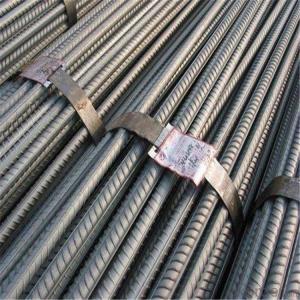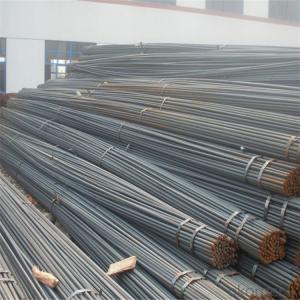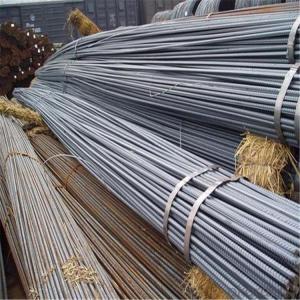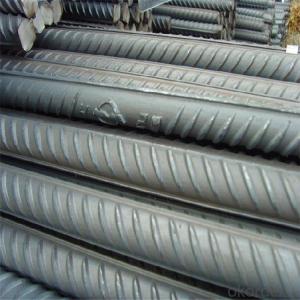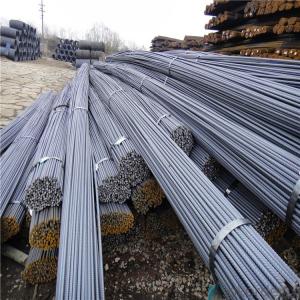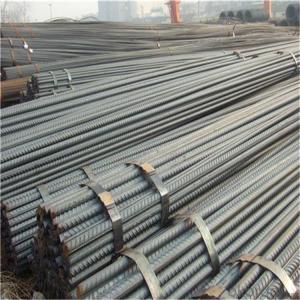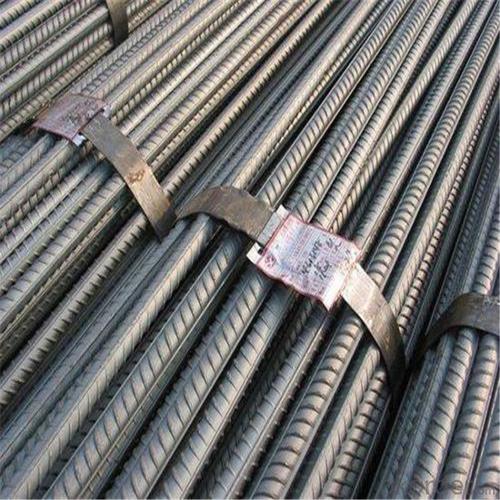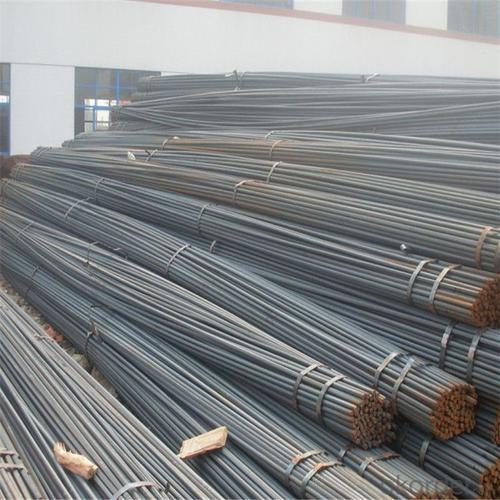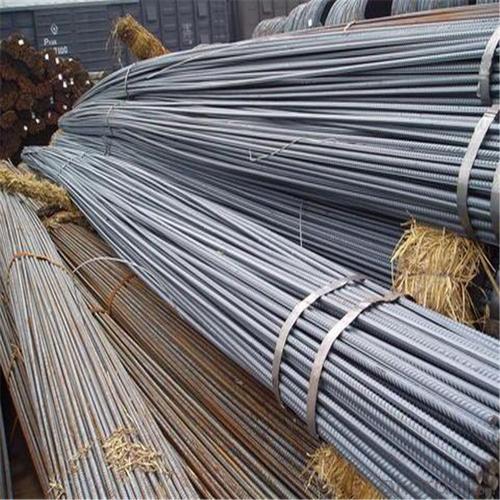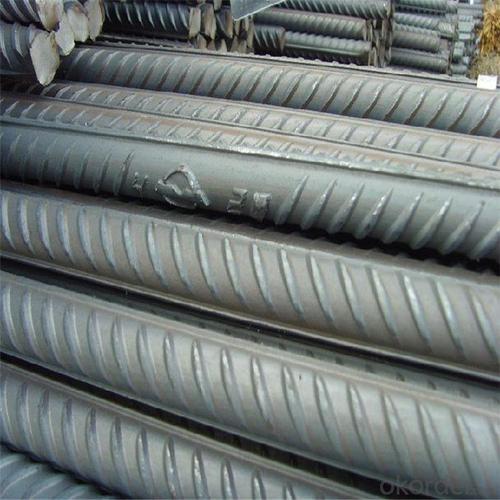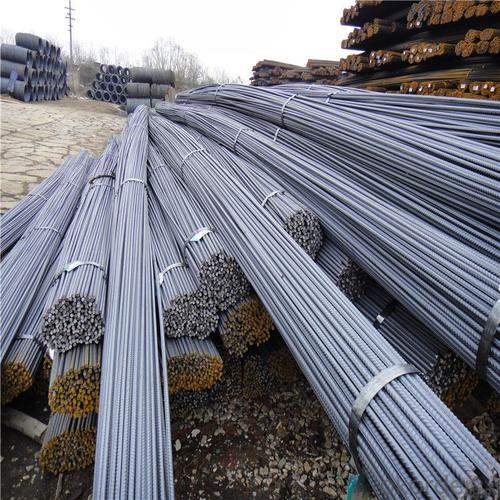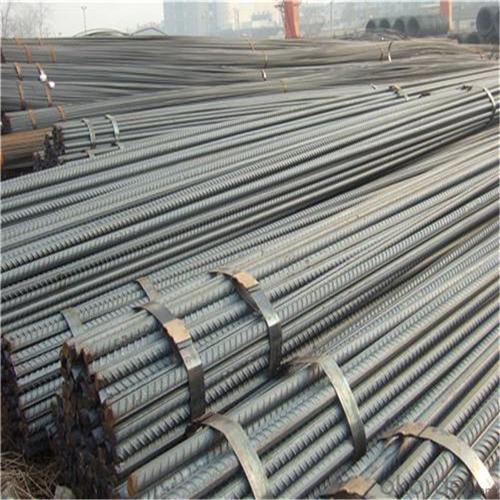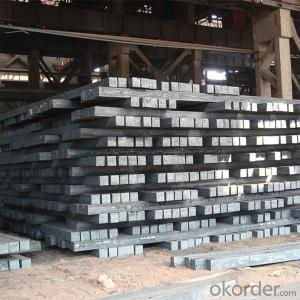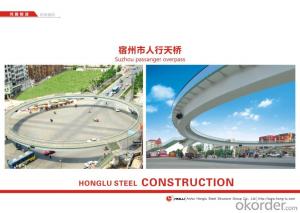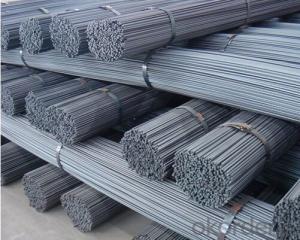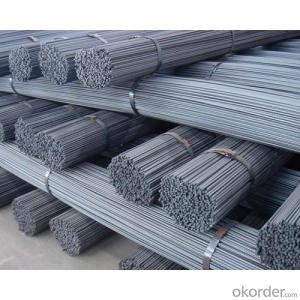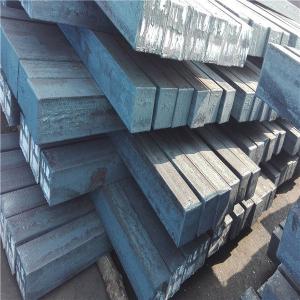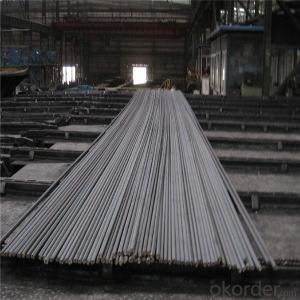Alloy Steel Rebar Made in China
- Loading Port:
- Tianjin
- Payment Terms:
- TT OR LC
- Min Order Qty:
- 110 m.t.
- Supply Capability:
- 50000 m.t./month
OKorder Service Pledge
OKorder Financial Service
You Might Also Like
Specification
Alloy Steel Rebar Made in China
Description of Alloy Steel Rebar Made in China
1, Diameter: 5.5mm-10mm Alloy Steel Rebar
10m- 40mm Alloy Steel Rebar
2, Length: 6m, 9m, 12m or customized
3, Standard: GB, ASTM, AISI, SAE, DIN, JIS, EN
OEM technology - send detailed technical parameters for accurate quotation.
2, Produce Process: smelt iron - EAF smelt billet - ESR smelt billet -
hot rolled or forged to get the steel round bar and plate
3, Heat Treatment: annealing, normalizing, tempering, quenching
4, Surface Treatment: Black
5, Quality Assurance: We accept third party inspection for all orders.
You can ask testing organizations such as SGS, BV, etc. to test our products before shipping.
Chemical Composition of Alloy Steel Rebar Made in China
Grade | Technical data of the original chemical composition(%) | |||||
Reinforcing steel bar HRB335 | C | Mn | Si | S | P | B |
≤0.25 | ≤1.60 | ≤0.80 | ≤0.045 | ≤0.045 | >0.0008 | |
Physics Capability | ||||||
Yield Strength(N/cm2) | Tensile Strength(N/cm2) | Elongation(%) | ||||
≥ 335 | ≥490 | ≥16 | ||||
Reinforcing steel bar HRB400 | C | Mn | Si | S | P | B |
≤0.25 | ≤0.16 | ≤0.80 | ≤0.045 | ≤0.045 | 0.04-0.12 | |
Physics Capability | ||||||
Yield Strength(N/cm2) | Tensile Strength(N/cm2) | Elongation(%) | ||||
≥ 400 | ≥ 570 | ≥ 14 | ||||
Products Show of Alloy Steel Rebar Made in China
Company Information
CNBM International Corporation is the most important trading platform of CNBM group.
Whith its advantages, CNBM International are mainly concentrate on Cement, Glass, Iron and Steel, Ceramics industries and devotes herself for supplying high qulity series of refractories as well as technical consultancies and logistics solutions.


F A Q
1, Your advantages?
professional products inquiry, products knowledge train (for agents), smooth goods delivery, excellent customer solution proposale
2, Test & Certificate?
SGS test is available, customer inspection before shipping is welcome, third party inspection is no problem
3, Factory or Trading Company?
CNBM is a trading company but we have so many protocol factories and CNBM works as a trading department of these factories. Also CNBM is the holding company of many factories.
4, Payment Terms?
30% TT as deposit and 70% before delivery.
Irrevocable L/C at sight.
5, Trading Terms?
EXW, FOB, CIF, FFR, CNF
6, After-sale Service?
CNBM provides the services and support you need for every step of our cooperation. We're the business partner you can trust.
For any problem, please kindly contact us at any your convenient time.
We'll reply you in our first priority within 24 hours.
- Q: How does special steel perform in extreme weather conditions?
- Special steel is specifically designed to have enhanced performance in extreme weather conditions. It exhibits exceptional strength, durability, and resistance to corrosion, making it highly suitable for withstanding harsh environments such as extreme heat, cold, humidity, and strong winds. Additionally, special steel maintains its mechanical properties and structural integrity even under extreme temperature variations, ensuring its reliability and longevity in adverse weather conditions.
- Q: Can special steel be used in automotive engine components?
- Yes, special steel can be used in automotive engine components. Special steel, also known as alloy steel, is specifically designed to have enhanced properties such as increased strength, toughness, and heat resistance. These properties make it ideal for use in critical engine components that are subjected to high temperatures, stress, and wear. In automotive engines, special steel can be used in various components such as crankshafts, camshafts, connecting rods, valves, and piston rings. These components are subjected to extreme conditions, including high temperatures, pressure, and rotational forces. Special steel provides the required strength and durability to withstand these conditions, ensuring reliable engine performance and longevity. The use of special steel in automotive engine components offers several advantages. Firstly, it increases the strength and load-carrying capacity of the components, allowing them to handle higher power and torque outputs. Secondly, special steel improves the fatigue resistance and durability of the components, reducing the risk of failure and extending their service life. Lastly, special steel can withstand the high temperatures and thermal cycling experienced in the engine, preventing deformation and maintaining dimensional stability. Overall, the use of special steel in automotive engine components is crucial for achieving optimal performance, reliability, and longevity. It ensures that the engine can withstand the demanding conditions it operates under, providing a smoother and more efficient driving experience.
- Q: How is corrosion-resistant alloy steel used in the production of chemical processing equipment?
- Corrosion-resistant alloy steel is widely used in the production of chemical processing equipment due to its ability to withstand harsh chemical environments. It is used to construct various components such as pipes, tanks, valves, and heat exchangers, providing excellent resistance to corrosion and chemical attack. This ensures the integrity and longevity of the equipment, preventing leaks, contamination, and potential hazards. Additionally, corrosion-resistant alloy steel offers high strength and durability, making it suitable for handling aggressive chemicals and maintaining operational efficiency in chemical processing plants.
- Q: How is weathering steel used in outdoor structures?
- Weathering steel is commonly used in outdoor structures due to its unique ability to form a protective rust-like coating, which not only enhances its aesthetic appeal but also acts as a barrier against further corrosion. This steel is often utilized in bridges, sculptures, buildings, and other architectural elements, providing durability, strength, and a distinct rust-colored appearance that blends harmoniously with the natural surroundings.
- Q: How does special steel contribute to the performance of industrial machinery?
- Special steel plays a crucial role in enhancing the performance of industrial machinery in various ways. Firstly, special steel possesses superior mechanical properties such as high strength, hardness, and toughness, which make it suitable for withstanding heavy loads, vibrations, and impact forces commonly encountered in industrial applications. This enables the machinery to operate efficiently and reliably under demanding conditions. Moreover, special steel has excellent corrosion resistance, which is particularly important in industries where machinery is exposed to harsh environments or corrosive substances. By preventing the degradation of components due to corrosion, special steel helps to extend the lifespan of the machinery and reduce maintenance costs. Additionally, special steel can be tailored to specific applications through various alloying elements and heat treatments. This allows manufacturers to optimize the material's properties to meet the specific requirements of the industrial machinery, such as wear resistance, heat resistance, or high-temperature strength. By using special steel, manufacturers can achieve higher performance levels and improve the overall efficiency of their machinery. Furthermore, special steel offers superior dimensional stability and machinability. This ensures that components can be manufactured to precise specifications, thereby reducing the potential for errors or inaccuracies that may affect the performance of the machinery. The machinability of special steel also allows for easier fabrication and assembly, improving the overall production process and reducing manufacturing costs. In conclusion, special steel contributes significantly to the performance of industrial machinery through its superior mechanical properties, corrosion resistance, tailorability, dimensional stability, and machinability. By utilizing special steel in the construction of machinery components, manufacturers can enhance the durability, reliability, and efficiency of their products, ultimately leading to improved productivity and profitability in various industries.
- Q: What are the different inspection methods used for special steel?
- There are several inspection methods used for special steel, including visual inspection, ultrasonic testing, magnetic particle inspection, dye penetrant inspection, and hardness testing. These methods help ensure the quality and integrity of special steel by detecting any surface defects, internal flaws, or variations in hardness.
- Q: What are the requirements for special steel used in industrial equipment manufacturing?
- The requirements for special steel used in industrial equipment manufacturing typically include high strength, durability, corrosion resistance, and the ability to withstand high temperatures and pressure. Additionally, the steel should have excellent machinability and weldability to facilitate the manufacturing process. These requirements ensure that the steel can withstand the demanding conditions and provide long-lasting performance in industrial equipment.
- Q: What are the applications of special steel in the manufacturing industry?
- Special steel has a wide range of applications in the manufacturing industry, including the production of tools, machinery, and equipment. It is commonly used in sectors such as automotive, aerospace, energy, and construction due to its exceptional strength, durability, and resistance to corrosion. Special steel is also utilized in the manufacturing of components that require high wear resistance, such as gears, bearings, and cutting tools. Its versatility and unique properties make it an essential material in various industrial applications.
- Q: What are the different methods of hardening special steel?
- There are several methods of hardening special steel, each with its own advantages and applications. 1. Quenching: This is a common method used to harden steel. It involves heating the steel to a critical temperature and then rapidly cooling it by immersing it in a quenching medium such as oil, water, or air. This rapid cooling causes the formation of a martensitic structure, which is harder and more brittle than the original steel. 2. Tempering: After quenching, the steel is often tempered to reduce brittleness and improve toughness. Tempering involves reheating the hardened steel to a specific temperature and holding it at that temperature for a predetermined amount of time. This process helps to reduce internal stresses and improve the overall mechanical properties of the steel. 3. Case hardening: This method is used to increase the hardness of the outer layer of steel while maintaining a tough and ductile core. Case hardening involves introducing carbon or nitrogen into the surface of the steel through processes like carburizing or nitriding. This creates a hard surface layer while maintaining the desired properties in the core. 4. Induction hardening: This technique is commonly used for specific areas of a component that require localized hardening. It involves using an electromagnetic field to heat only a specific region of the steel, followed by rapid quenching. Induction hardening provides precise control over the hardened area while maintaining the desired properties in the rest of the component. 5. Cryogenic treatment: This method involves subjecting the hardened steel to extremely low temperatures, often below -150°C (-238°F). This process helps to further refine the microstructure of the steel, improving its hardness, wear resistance, and dimensional stability. 6. Flame hardening: This method involves heating the surface of the steel using a high-temperature flame and then quenching it. Flame hardening is commonly used for large components or areas that require localized hardening. It is important to choose the appropriate method based on the specific requirements of the steel and the intended application. The selection of the method depends on factors such as the desired hardness, toughness, wear resistance, and dimensional stability of the steel.
- Q: How does special steel perform in cryogenic corrosion resistance?
- Special steels are known for their excellent performance in cryogenic corrosion resistance. When exposed to extremely low temperatures, such as those encountered in cryogenic applications, regular steels tend to become brittle and susceptible to corrosion. However, special steels are specifically designed to withstand these conditions and maintain their mechanical properties and corrosion resistance. The performance of special steels in cryogenic environments is mainly attributed to their composition and microstructure. These steels are typically alloyed with elements such as nickel, molybdenum, and nitrogen, which enhance their resistance to corrosion at low temperatures. Additionally, the microstructure of special steels is carefully controlled, resulting in a fine grain size and homogeneous distribution of alloying elements. This microstructure contributes to the steel's ability to resist corrosion and maintain its mechanical strength even at cryogenic temperatures. Furthermore, special steels undergo rigorous testing to ensure their suitability for cryogenic applications. They are subjected to low-temperature impact tests, which assess their toughness and resistance to brittle fracture. These tests verify that the steel can withstand the stresses and strains imposed by cryogenic conditions without failure. Overall, special steels exhibit excellent cryogenic corrosion resistance due to their unique composition, microstructure, and thorough testing. They are a preferred choice for applications that require reliable performance at extremely low temperatures, such as in the aerospace, energy, and scientific research industries.
Send your message to us
Alloy Steel Rebar Made in China
- Loading Port:
- Tianjin
- Payment Terms:
- TT OR LC
- Min Order Qty:
- 110 m.t.
- Supply Capability:
- 50000 m.t./month
OKorder Service Pledge
OKorder Financial Service
Similar products
Hot products
Hot Searches
Related keywords
